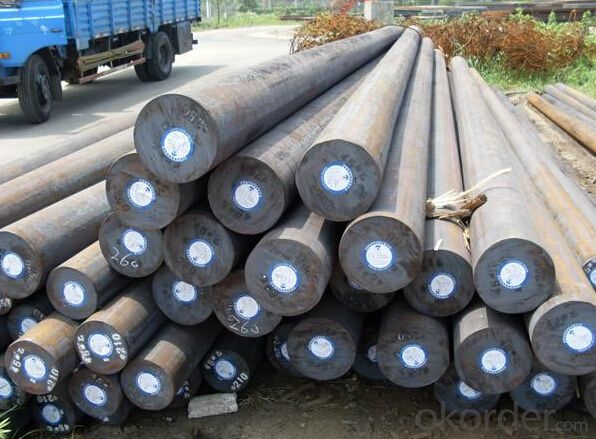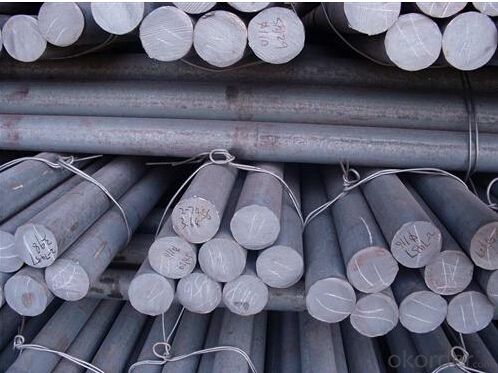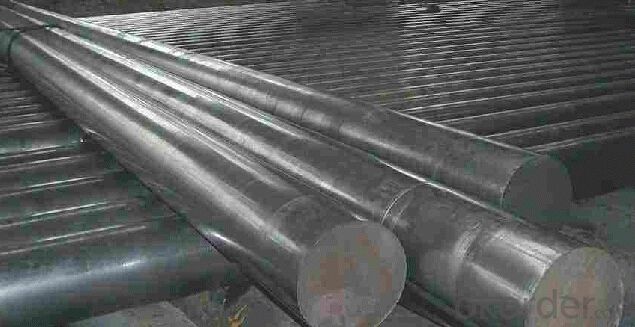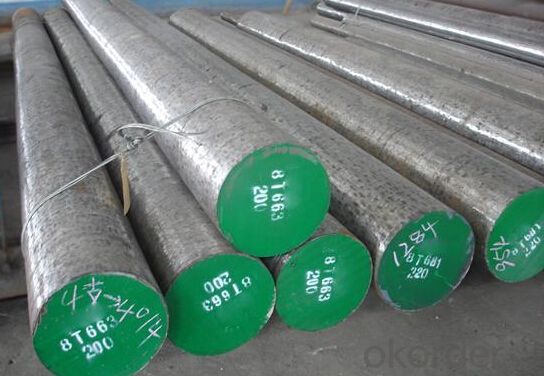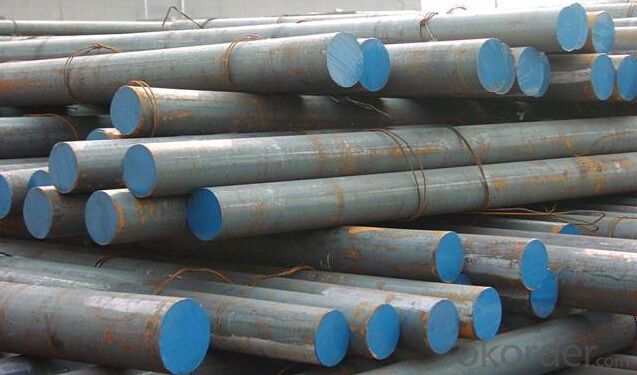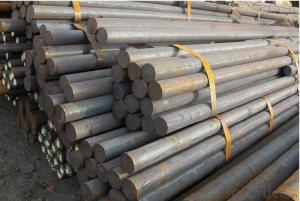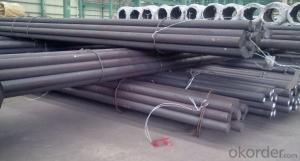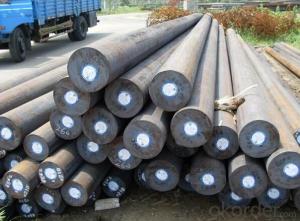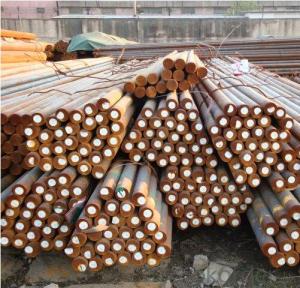Grade 12Cr1MoVG Alloy Steel / Tubular Steel Round Bar
- Loading Port:
- Shanghai
- Payment Terms:
- TT OR LC
- Min Order Qty:
- 3 m.t
- Supply Capability:
- 10000 m.t/month
OKorder Service Pledge
OKorder Financial Service
You Might Also Like
Specification
Specifications of Round Bar
1.hot rolled black surface
2. fine mechanical performance
3. Delivery condition: Hot-rolled,black surface.
4. AISI/ASTM 4140,42CrMo4 Din1.7225,SCM440 JIS
Chemical Composition
C | Si | Mn | P | S | Cr | Mo |
0.38-0.45 | ≤0.4 | 0.6-0.9 | ≤0.035 | ≤0.030 | 0.9-1.2 | 0.15-0.30 |
Our Featured Products
Alloy steel: Combination of steel / Bearing steel// Spring steel/ Cr- mo steel
GB 20Cr/ 40Cr / 42CrMo / 35CrMo/ 20CrMn/GCr15/30CrMnTi…
ASTM 5120 /5140 / 4140/ 4135/ 5152/52100…
JIS SCr420H/ SCr440/ SCM3/ SUP9/SUJ2…
Carbon steel: Carbon tool steel /Carbon Structural Steel
GB 20/ 35 /45/…
ASTM 1020/ 1030/1045…
JIS S20C/ S30C / S45C…
Usage and Applications of Round Bar
1. Chinese standard steel bar is often used where large amounts of steel need to be formed, for example as structural steel.
2. And we can use this kind of product on the performance of the mechanical parts if the demand is not very high.
3. Steel round bar is used in construction and a large number of architectural and engineering structures.
Packaging & Delivery of Round Bar
Packaging Detail: All goods are packed in bundle with steel strips and shipped by break bulk vessel or container (depend on target market and different ports)
Delivery Detail: 15~45 days
Trade terms: FOB, CFR, CIF
Weight: Theprice invoicing on theoretical weight basis or actual weight basis depends on customer’s request.
Shipment: The shipment of bulk break or container is depends on customer’s request and the situation of the port of destination.
Documents given: Full set of original clean on board bill of lading; Original signed commercial invoice; Original packing list; Policy of insurance; Certificate of origin and what the target market needs.
FAQ:
Q1: Why buy Materials & Equipment from OKorder.com?
A1: All products offered byOKorder.com are carefully selected from China's most reliable manufacturing enterprises. Through its ISO certifications, OKorder.com adheres to the highest standards and a commitment to supply chain safety and customer satisfaction.
Q2: How do we guarantee the quality of our products?
A2: We have established an advanced quality management system which conducts strict quality tests at every step, from raw materials to the final product. At the same time, we provide extensive follow-up service assurances as required.
Q3: How soon can we receive the product after purchase?
A3: Within three days of placing an order, we will begin production. The specific shipping date is dependent upon international and government factors, but is typically 7 to 10 workdays.
Q4: What makes stainless steel stainless?
A4: Stainless steel must contain at least 10.5 % chromium. It is this element that reacts with the oxygen in the air to form a complex chrome-oxide surface layer that is invisible but strong enough to prevent further oxygen from "staining" (rusting) the surface. Higher levels of chromium and the addition of other alloying elements such as nickel and molybdenum enhance this surface layer and improve the corrosion resistance of the stainless material.
Q5: Can stainless steel rust?
A5: Stainless does not "rust" as you think of regular steel rusting with a red oxide on the surface that flakes off. If you see red rust it is probably due to some iron particles that have contaminated the surface of the stainless steel and it is these iron particles that are rusting. Look at the source of the rusting and see if you can remove it from the surface.
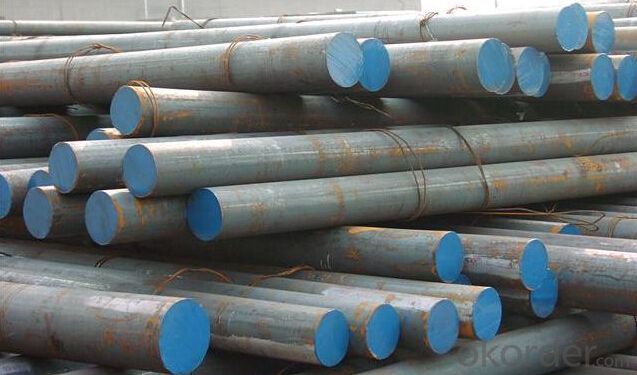
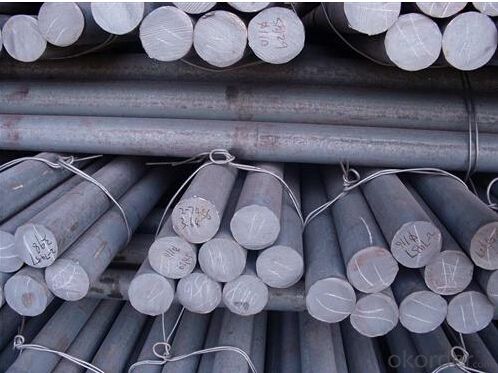
- Q: What are the different surface treatment techniques for special steel?
- There are several surface treatment techniques available for special steel, including electroplating, hot-dip galvanizing, powder coating, and passivation. Electroplating involves depositing a layer of metal onto the steel surface through an electrochemical process, providing enhanced corrosion resistance and aesthetic appeal. Hot-dip galvanizing immerses the steel in molten zinc, forming a protective zinc coating that prevents rusting. Powder coating involves applying a dry powder onto the steel surface, which is then heated and fused to create a durable and decorative finish. Passivation is a chemical process that removes surface contaminants and forms a protective oxide layer on the steel, improving its corrosion resistance.
- Q: What are the applications of special steel in the nuclear supply chain?
- Special steel has numerous applications in the nuclear supply chain. It is used in the construction of nuclear reactors, where it provides the necessary strength and resistance to extreme temperatures and pressures. Special steel is also utilized in the manufacturing of fuel rods, containment vessels, and other critical components that require high durability and corrosion resistance. Additionally, special steel is employed in the production of storage containers for nuclear waste and in the construction of transportation casks for the safe transport of radioactive materials.
- Q: What are the different heat treatment processes used in special steel?
- There are several heat treatment processes used in special steel, including annealing, normalizing, quenching, tempering, and precipitation hardening. Annealing involves heating the steel to a high temperature and then slowly cooling it, which helps to relieve internal stresses and improve its ductility. Normalizing is similar to annealing, but the cooling process is done in still air, resulting in a more uniform grain structure. Quenching involves rapidly cooling the steel in a liquid, such as water or oil, to achieve high hardness and strength. Tempering is a process that follows quenching, where the steel is reheated to a specific temperature and then cooled, which reduces the brittleness and improves toughness. Lastly, precipitation hardening involves heating the steel to a high temperature and then cooling it quickly to form fine precipitates that enhance its strength.
- Q: What are the different forging techniques for special steel?
- For special steel, different forging techniques can be utilized depending on the desired properties and characteristics of the final product. Some commonly employed techniques are as follows: 1. Open-die forging, also known as smith forging or hand forging, involves shaping the steel between two flat dies or anvils. The metal is heated and hammered repeatedly until it achieves the desired shape. This technique is suitable for larger and more intricate components like shafts, cylinders, or discs. 2. Closed-die forging, also called impression-die forging, entails shaping the steel within a set of dies that contain the desired shape. The metal is placed between the dies and compressed under high pressure. Closed-die forging is often used for smaller, more intricate components, providing greater control over the final shape and dimensions. 3. Roll forging involves passing the steel between two or more rotating rolls to shape it. The rolls exert pressure on the metal, causing it to deform and acquire the desired shape. This technique is commonly used for producing long, cylindrical components such as axles, bars, or rings. 4. Upset forging involves deforming the steel by reducing its length and increasing its cross-sectional area. The metal is placed between two dies and axially compressed, resulting in bulging and the desired shape. Upset forging is commonly utilized for producing short, thick components like bolts, screws, or nuts. 5. Press forging, similar to closed-die forging, employs a hydraulic or mechanical press to shape the steel. The metal is placed between two dies and compressed under high pressure, allowing controlled deformation. Press forging enables precise control over the shaping process and is often employed for producing high-quality and complex components. Each of these forging techniques possesses its own advantages and limitations, and the choice of technique relies on factors such as size, complexity, and desired properties of the final product. By selecting the appropriate forging technique, manufacturers can ensure that special steel components meet the required specifications and performance standards.
- Q: What are the different surface cleaning methods used for special steel?
- There are several surface cleaning methods that can be used for special steel, depending on the specific requirements and the level of cleanliness desired. Some of the commonly used methods include: 1. Mechanical Cleaning: This method involves the use of abrasive materials or tools to physically remove dirt, rust, and other contaminants from the surface of the steel. It can be done through processes such as sanding, wire brushing, or abrasive blasting. 2. Chemical Cleaning: Chemical cleaning involves the use of chemical agents to dissolve or loosen dirt, grease, oil, or rust from the surface of the steel. Different types of chemicals can be used depending on the type and severity of the contaminants. Acid pickling is one such method that involves immersing the steel in an acid solution to remove scale and rust. 3. High-pressure Water Cleaning: This method utilizes the force of high-pressure water jets to remove dirt, grease, and other contaminants from the surface of the steel. It is effective in removing loose particles and can be used as a pre-cleaning step before other surface preparation methods. 4. Ultrasonic Cleaning: Ultrasonic cleaning is a non-abrasive method that uses high-frequency sound waves to create microscopic bubbles in a cleaning solution. These bubbles implode upon contact with the surface of the steel, effectively removing contaminants from hard-to-reach areas. 5. Electrochemical Cleaning: This method involves passing an electric current through a cleaning solution or electrolyte to facilitate the removal of contaminants from the steel surface. It is useful in removing rust and restoring the steel's appearance. 6. Thermal Cleaning: Thermal cleaning methods, such as flame cleaning or heat treatment, involve subjecting the steel to high temperatures to burn off organic contaminants or to induce controlled oxidation and subsequent removal of scale, rust, or other surface impurities. It is important to note that the choice of surface cleaning method depends on various factors, including the type of contaminants, the condition of the steel, the desired level of cleanliness, and the overall application requirements. A combination of different methods may be used to achieve the best results.
- Q: What are the common challenges in heat treatment of special steel?
- To achieve the desired material properties, careful attention must be given to several challenges encountered in the heat treatment of special steel. One primary challenge revolves around the necessity for meticulous temperature control throughout the heating and cooling stages. Special steels typically have specific temperature ranges for heat treatment that must be strictly adhered to in order to attain the desired microstructure and mechanical properties. Failing to maintain precise temperature control can result in inadequate or inconsistent heat treatment, ultimately leading to suboptimal material performance. Another challenge lies in the potential distortion or warping of the steel components during the heat treatment process. Special steels often possess intricate designs or complex shapes, making them more susceptible to distortion when subjected to high temperatures. This distortion can have adverse effects on the overall quality and dimensional accuracy of the final product. Consequently, careful consideration must be given to the selection of suitable heating and cooling methods, as well as the utilization of fixtures or jigs to minimize distortion. Moreover, special steels may contain alloying elements that significantly influence the heat treatment process. Elements like chromium, molybdenum, or vanadium can alter the steel's hardenability, tempering response, or transformation behavior. Their presence can introduce additional challenges when determining the optimal heat treatment parameters, necessitating adjustments to heating and cooling rates, soak times, or quenching media. Lastly, achieving uniformity in heat treatment across a batch of special steel components can prove to be challenging. Variations in size, shape, or composition within a batch can result in inconsistent heat treatment outcomes. Controlling the heating and cooling rates, ensuring proper circulation of the heat treatment media, and implementing effective process monitoring techniques are essential in achieving consistent and uniform material properties. In conclusion, the heat treatment of special steel encompasses challenges such as precise temperature control, distortion/warping, the influence of alloying elements, and achieving uniformity across a batch. Successfully addressing these challenges requires a comprehensive understanding of the steel's composition, meticulous process planning, and the utilization of appropriate process controls and monitoring techniques.
- Q: What are the different surface coating techniques for special steel?
- There are several surface coating techniques available for special steel, including electroplating, hot-dip galvanizing, powder coating, and thermal spraying. Each technique offers unique benefits and is used depending on the specific requirements of the steel and its intended application. Electroplating involves depositing a layer of metal onto the surface of the steel through an electrochemical process, providing enhanced corrosion resistance. Hot-dip galvanizing, on the other hand, involves immersing the steel in a bath of molten zinc, creating a protective layer that prevents rust and corrosion. Powder coating involves applying a dry powder to the surface of the steel and then heating it to form a durable, attractive coating. Finally, thermal spraying involves applying a coating material, such as metal or ceramic, onto the steel surface using a high-velocity flame or plasma jet, providing protection against wear, corrosion, and high temperatures.
- Q: Can special steel be used in construction?
- Yes, special steel can be used in construction. Special steel, also known as alloy steel, offers superior strength, durability, and resistance to corrosion and wear compared to regular steel. It is commonly used in the construction of high-rise buildings, bridges, and other structures that require exceptional strength and longevity. Additionally, special steel can be customized to meet specific project requirements, making it a versatile choice for construction applications.
- Q: How is special steel used in the construction industry?
- Special steel is used in the construction industry for various applications due to its exceptional strength, durability, and resistance to corrosion. It is commonly used for manufacturing structural components, such as beams, columns, and girders, that require high load-bearing capacities. Special steel is also utilized in the construction of bridges, towers, and high-rise buildings to ensure structural integrity and safety. Additionally, it finds application in reinforcing concrete structures, creating strong and long-lasting foundations. Overall, special steel plays a crucial role in enhancing the strength and stability of construction projects.
- Q: What are the requirements for special steel used in high-strength applications?
- The requirements for special steel used in high-strength applications typically include high tensile strength, excellent toughness, good corrosion resistance, and the ability to withstand extreme temperatures. Additionally, the steel must possess good weldability and formability to facilitate the manufacturing process. Furthermore, it should meet specific industry standards and specifications to ensure its suitability for the intended application.
Send your message to us
Grade 12Cr1MoVG Alloy Steel / Tubular Steel Round Bar
- Loading Port:
- Shanghai
- Payment Terms:
- TT OR LC
- Min Order Qty:
- 3 m.t
- Supply Capability:
- 10000 m.t/month
OKorder Service Pledge
OKorder Financial Service
Similar products
Hot products
Hot Searches
Related keywords





